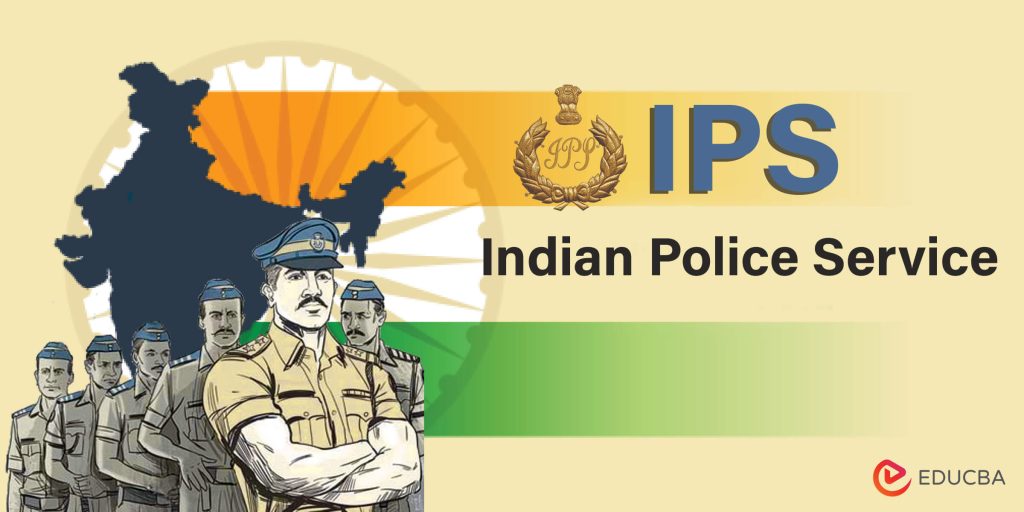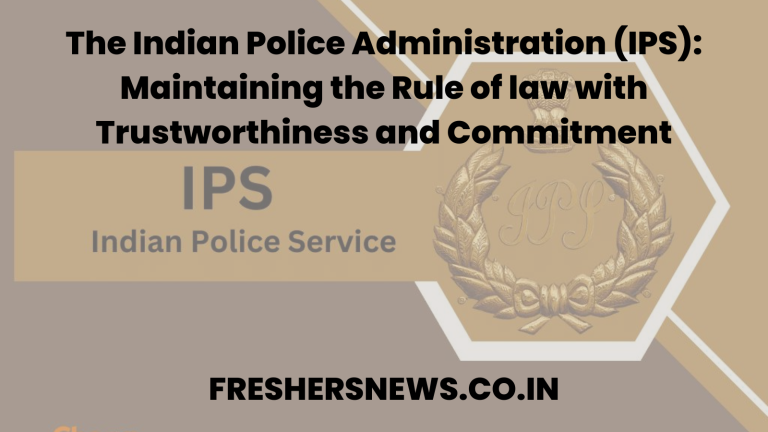Introduction:
In policing, abbreviations convey critical weight, representing authority, respectability, and administration. One such abbreviation is IPS, which means the Indian Police Service. Past its condensed structure, IPS addresses an esteemed framework of officials entrusted with maintaining the rule of law, guaranteeing public security, and battling wrongdoing across the different scenes of India. In this complete article, we leave on an excursion to unwind the full significance of IPS, investigate its beginnings, dig into the thorough choice cycle, dissect its hierarchical construction, survey its effect on society, and distinguish the difficulties it faces in satisfying its primary goal. Here, we are talking about The Indian Police Administration (IPS): Maintaining the Rule of law with Trustworthiness and Commitment.

Here, we are talking about The Indian Police Administration (IPS): Maintaining the Rule of law with Trustworthiness and Commitment:
Figuring out IPS – Indian Police Administration
Verifiable Setting
The Indian Police Administration follows its beginnings to the provincial period when the English established a unified police power to keep up with command over their tremendous pioneer domains. Over the long run, as India acquired freedom in 1947, the requirement for an expert and responsible police administration prompted the making of the Indian Police Administration.
Job and Obligations
The essential command of the Indian Police Administration is to implement the law, forestall and explore wrongdoing, keep public control, and guarantee the well-being and security of residents. IPS officials depend on many obligations, including watching, wrongdoing counteraction, criminal examinations, traffic the executives, and local area policing.
The Selection Cycle – Thorough and Merit-Based
Union Public Service Commission (UPSC) Assessment
Turning into an IPS official is a profoundly cutthroat and legitimacy-based process. Imminent competitors should initially clear the Common Administrations Assessment led by the Union Public Service Commission (UPSC). This far-reaching assessment evaluates competitors’ fitness, information, and character qualities across different subjects.
Preparing at the National Police Academy
After clearing the UPSC assessment, effective competitors go through preparation at the Sardar Vallabhbhai Patel National Police Academy (SVPNPA) situated in Hyderabad. The preparation educational plan incorporates theoretical study, Physical wellness systems, field drills, and reasonable preparation in different parts of policing.
All-India Service
IPS is an All India Administration, meaning officials can be designated to any state or association domain given the prerequisites and opportunities. This guarantees a uniform norm of policing the nation over and considers the trading of best practices and encounters among officials from various locales.
Hierarchical Design and Order
Rank Order
The Indian Police Administration follows a progressive design, with officials holding various positions in light of their status and experience. The ordered progression regularly incorporates positions, for example, Director General of Police (DGP), Additional Director General of Police (ADGP), Inspector General of Police (IGP), Deputy Inspector General of Police (DIG), Superintendent of Police (SP), and Assistant Superintendent of Police (ASP).
Administrative and Operational Roles
IPS officials are allocated to different authoritative and functional jobs inside the police division. Contingent upon their position and aptitude, they might lead police headquarters, head specific units, administer region-level tasks, or stand firm on critical footholds in the state or Central government offices.
IPS and its Effect on Society
Maintaining The rule of law
At the center of its command, the Indian Police Administration is entrusted with maintaining the rule of law, guaranteeing that residents can live and work free from any potentially harmful climate. IPS officials are vital in forestalling wrongdoing, securing wrongdoers, and keeping up with harmony and quietness in the public eye.
Local area Policing and Public Commitment
IPS officials progressively perceive the significance of local area policing and public commitment to encouraging trust and collaboration between policing and the local area. By drawing in with partners, tending to local area concerns, and executing proactive policing methodologies, IPS officials can construct more grounded and more substantial networks.
Fighting Coordinated Wrongdoing and Psychological Warfare
In a period set apart by developing security dangers, IPS officials are at the front of fighting coordinated wrongdoing, psychological oppression, and rebellion. Their particular preparation, vital preparation, and coordination with other policing are instrumental in disturbing lawbreaker organizations and defending public safety.
Difficulties and Changes
Guaranteeing Police Responsibility
One of the perpetual difficulties confronting the Indian Police Administration is guaranteeing responsibility and straightforwardness inside the police force. Cases of defilement, unfortunate behavior, and common liberties infringement highlight the requirement for fundamental changes, including better oversight systems, improved preparation on morals and uprightness, and stricter disciplinary activities against wayward officials.
Modernization and Innovative Combination
With fast innovation progress, the Indian Police Administration should embrace modernization and mechanical reconciliation to improve its functional capacities. This incorporates conveying progressed observation frameworks, utilizing information examination for prescient policing, and outfitting officials with the most recent correspondence and scientific instruments.
Tending to Faculty Deficiencies and Responsibility
The Indian Police Administration wrestles with faculty deficiencies and weighty jobs, especially at the grassroots level. Tending to these difficulties requires selecting and preparing more officials, working on working circumstances and government assistance gauges, and executing creative staffing models to enhance asset designation.
FAQ about the Indian Police Service (IPS):
What is the Indian Police Administration (IPS)?
The Indian Police Service (IPS) is one of the three All India Services, alongside the Indian Administrative Service (IAS) and the Indian Forest Services. It is responsible for keeping up with the rule of law, forestalling and researching wrongdoing, and guaranteeing the well-being and security of residents in India.
How does one become an IPS officer?
To become an IPS official, competitors should clear the Civil Services Examination conducted by the Union Public Service Commission (UPSC). Upon Selection, applicants go through preparation at the Sardar Vallabhbhai Patel National Police Academy (SVPNPA) before being distributed to different states or association regions given opportunities and prerequisites.
What are the positions inside the IPS?
The IPS follows a progressive design with different positions, including Director General of Police (DGP), Additional Director General of Police (ADGP), Inspector General of Police (IGP), Deputy Inspector General of Police (DIG), Superintendent of Police (SP), and Additional Superintendent of Police (ASP), among others.
What are the essential obligations of IPS officers?
IPS officials are entrusted with maintaining the rule of law, forestalling and exploring wrongdoing, keeping public control, and guaranteeing the well-being and security of residents. They direct different parts of policing, including watching, wrongdoing anticipation, criminal examinations, traffic the executives, and local area policing.
What is the meaning of IPS in society?
The IPS plays a significant part in maintaining harmony and strength inside society. IPS officials work eagerly to forestall wrongdoing, capture guilty parties, and defend the privileges and interests of residents. They likewise participate in local area policing drives to construct trust and collaboration with the general population.
How does the IPS address difficulties like debasement and misconduct?
The IPS is focused on guaranteeing responsibility and straightforwardness inside the police force. Measures like better oversight systems improved preparation on morals and respectability, and stricter disciplinary activities against deviant officials are carried out to resolve issues of debasement and wrongdoing.
What job does innovation play in modernizing the IPS?
Innovation is essential in modernizing the IPS and upgrading its functional capacities. High-level observation frameworks, information examination for prescient policing, best-in-class correspondence, and measurable devices are conveyed to develop further proficiency and viability in fighting wrongdoing.
How does the IPS team up with the community?
IPS officials progressively perceive the significance of local area policing and public commitment. They effectively draw in partners, address local area concerns, and use proactive policing techniques to construct more grounded and substantial networks.
What are a portion of the difficulties faced by the IPS?
Challenges faced by the IPS incorporate staff deficiencies, weighty responsibilities, tending to raise security dangers, and guaranteeing the government assistance and prosperity of the police workforce. Growing to these difficulties requires consistent changes, interest in preparation and innovation, and closer joint effort with the local area.
How does the IPS add to public security?
The IPS assumes an urgent part in battling coordinated wrongdoing, psychological oppression, and revolt, in this way adding to public safety. IPS officials get particular preparation and work intimately with other policing to upset criminal organizations and protect the country’s security advantages.
Conclusion
As Simplification, the Indian Police Administration (IPS) addresses a foundation that fills in as the rampart of policing public security in India. From its verifiable roots to its contemporary job battling wrongdoing and controlling everything, IPS officials typify the best expectations of fantastic skill, trustworthiness, and devotion to obligation. As India keeps exploring the complicated difficulties of the 21st Century, the IPS stays unflinching in its responsibility to serve and safeguard the country and its residents. Through continuous changes, interests in preparation and innovation, and closer cooperation with the local area, the IPS is ready to meet the advancing necessities of society and maintain the standards of equity, uniformity, and law and order.

